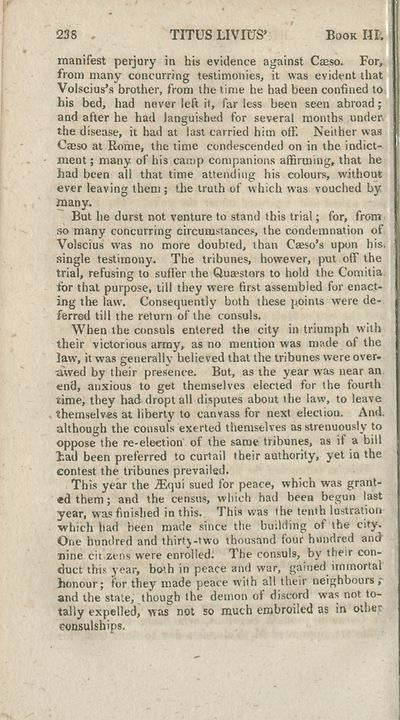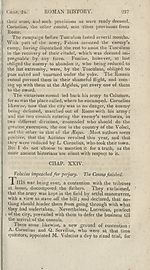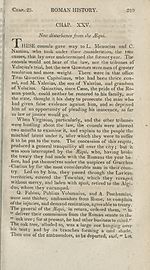Download files
Complete book:
Individual page:
Thumbnail gallery: Grid view | List view

238
TITUS LIVIUS’
Book III,
manifest perjury in bis evidence against Caeso. For,
from many concurring testimonies, it was evident that
Volscius’s brother, from the time he had been confined to
his bed, had never left it, far less been seen abroad;
and after he had languished for several months under
the disease, it had at last carried him off. Neither was
Caeso at Rome, the time condescended on in the indict¬
ment ; many of his camp companions affirming, that he
had been all that time attending his colours, without
ever leaving them ; the truth of which was vouched by
many.
But he durst not venture to stand this trial; for, from
so many concurring circumstances, the condemnation of
Volscius was no more doubted, than Caeso’s upon his.
single testimony. The tribunes, however, put off the
trial, refusing to suffer the Quaestors to hold the Comitia.
for that purpose, till they were first assembled for enact¬
ing the law. Consequently both these points w'ere de¬
ferred till the return of the consuls.
When the consuls entered the city in triumph with
their victorious army, as no mention was made of the
law, it was generally believed that the tribunes were over¬
awed by their presence. But, as the year was near an
end, anxious to get themselves elected for the fourth
time, they haddroptall disputes about the law, to leave
themselves at liberty to canvass for next election. And.
although the consuls exerted themselves as strenuously to
oppose the re-election of the same tribunes, as if a bill
F.ad been preferred to curtail their authority, yet in the
contest the tribunes prevailed.
This year the ^Equi sued for peace, which was grant¬
ed them; and the census, which had been begun last
year, was finished in this. This was the tenth lustration
which had been made since the building of the city.
One hundred and thirtj-two thousand four hundred and
nine cit zens were enrolled. The consuls, by their con¬
duct this year, both in peace and war, gained immortal
honour; for they made peace with all their neighbours,*■
and the state, though the demon of discord was not to¬
tally expelled, was not so much embroiled as in other
consulships.
TITUS LIVIUS’
Book III,
manifest perjury in bis evidence against Caeso. For,
from many concurring testimonies, it was evident that
Volscius’s brother, from the time he had been confined to
his bed, had never left it, far less been seen abroad;
and after he had languished for several months under
the disease, it had at last carried him off. Neither was
Caeso at Rome, the time condescended on in the indict¬
ment ; many of his camp companions affirming, that he
had been all that time attending his colours, without
ever leaving them ; the truth of which was vouched by
many.
But he durst not venture to stand this trial; for, from
so many concurring circumstances, the condemnation of
Volscius was no more doubted, than Caeso’s upon his.
single testimony. The tribunes, however, put off the
trial, refusing to suffer the Quaestors to hold the Comitia.
for that purpose, till they were first assembled for enact¬
ing the law. Consequently both these points w'ere de¬
ferred till the return of the consuls.
When the consuls entered the city in triumph with
their victorious army, as no mention was made of the
law, it was generally believed that the tribunes were over¬
awed by their presence. But, as the year was near an
end, anxious to get themselves elected for the fourth
time, they haddroptall disputes about the law, to leave
themselves at liberty to canvass for next election. And.
although the consuls exerted themselves as strenuously to
oppose the re-election of the same tribunes, as if a bill
F.ad been preferred to curtail their authority, yet in the
contest the tribunes prevailed.
This year the ^Equi sued for peace, which was grant¬
ed them; and the census, which had been begun last
year, was finished in this. This was the tenth lustration
which had been made since the building of the city.
One hundred and thirtj-two thousand four hundred and
nine cit zens were enrolled. The consuls, by their con¬
duct this year, both in peace and war, gained immortal
honour; for they made peace with all their neighbours,*■
and the state, though the demon of discord was not to¬
tally expelled, was not so much embroiled as in other
consulships.
Set display mode to:
![]() Universal Viewer |
Universal Viewer | ![]() Mirador |
Large image | Transcription
Mirador |
Large image | Transcription
| Antiquarian books of Scotland > Curiosities & wonders > Titus Livius' Roman history > (242) |
|---|
| Permanent URL | https://digital.nls.uk/115986053 |
|---|
| Description | Thousands of printed books from the Antiquarian Books of Scotland collection which dates from 1641 to the 1980s. The collection consists of 14,800 books which were published in Scotland or have a Scottish connection, e.g. through the author, printer or owner. Subjects covered include sport, education, diseases, adventure, occupations, Jacobites, politics and religion. Among the 29 languages represented are English, Gaelic, Italian, French, Russian and Swedish. |
|---|

